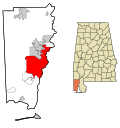Aimwell Baptist Church | |
 | |
| Location | 500 Earle Street, Mobile, Alabama, United States |
|---|---|
| Coordinates | 30°41′58″N88°3′10″W / 30.69944°N 88.05278°W |
| Built | 1946 |
| Architect | Heningburg, Nathaniel |
| Architectural style | Gothic Revival |
| NRHP reference No. | 08000458 [1] |
| Added to NRHP | May 29, 2008 |
Aimwell Baptist Church is a historic African American church in Mobile, Alabama. [1] The Baptist congregation was established in 1890 by two brothers. It took two years for the erection of the first building. [2] The current building, with Gothic Revival influences, was designed in 1946 by Nathaniel Heningburg and incorporates elements from the original structure. [1] [2] It was added to the National Register of Historic Places on May 29, 2008. [1]



